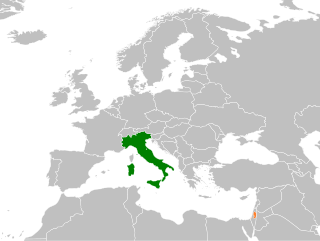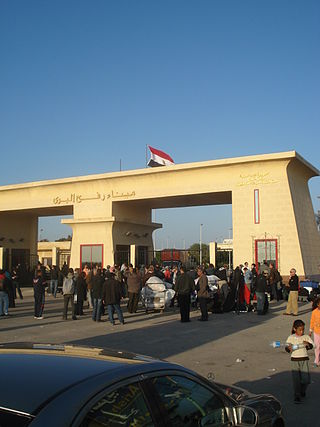| UN General Assembly Resolution ES-10/18 | |
|---|---|
| Date | 16 January 2009 |
| Meeting no. | 10th Emergency Special Session (continuation) |
| Code | A/RES/ES-10/18 (Document) |
| Subject | Israeli settlements in the Occupied Palestinian Territory, including East Jerusalem, and in the occupied Syrian Golan (2009) |
Voting summary |
|
| Result | Adopted |
United Nations General Assembly Resolution ES-10/18 was passed during the tenth emergency special session in response to the Gaza War (2008-2009). It aimed to enforce UN Security Council Resolution 1860, calling for an immediate ceasefire, withdrawal of Israeli forces from Gaza, and unimpeded humanitarian aid distribution. The resolution was adopted with overwhelming support (142-3) and 9 abstentions. [1]

The United Nations Truce Supervision Organization (UNTSO) is an organization founded on 29 May 1948 for peacekeeping in the Middle East. Established amidst the 1948 Arab–Israeli War, its primary task was initially to provide the military command structure to the peacekeeping forces in the Middle East to enable the peacekeepers to observe and maintain the ceasefire, and in assisting the parties to the Armistice Agreements in the supervision of the application and observance of the terms of those Agreements. The organization's structure and role has evolved over time as a result of the various conflicts in the region and at times UNTSO personnel have been used to rapidly deploy to other areas of the Middle East in support of other United Nations operations. The command structure of the UNTSO was maintained to cover the later peacekeeping organisations of the United Nations Disengagement Observer Force (UNDOF) and the United Nations Interim Force in Lebanon (UNIFIL) to which UNTSO continues to provide military observers.

The tenth emergency special session of the United Nations General Assembly centred on the Israeli–Palestinian conflict: the ongoing occupation of the West Bank and the Gaza Strip. The session was first convened in 1997 under the president of the General Assembly, Razali Ismail of Malaysia. This occurred when the Security Council failed to make a decision on the issue at two different meetings. The session is currently ongoing as of October 26, 2023.
United Nations General Assembly (UNGA) resolution 377 A, the "Uniting for Peace" resolution, states that in any cases where the Security Council, because of a lack of unanimity among its five permanent members (P5), fails to act as required to maintain international security and peace, the General Assembly shall consider the matter immediately and may issue appropriate recommendations to UN members for collective measures, including the use of armed force when necessary, in order to maintain or restore international security and peace. It was adopted 3 November 1950, after fourteen days of Assembly discussions, by a vote of 52 to 5, with 2 abstentions. The resolution was designed to provide the UN with an alternative avenue for action when at least one P5 member uses its veto to obstruct the Security Council from carrying out its functions mandated by the UN Charter.
Issues relating to the State of Palestine and aspects of the Israeli–Palestinian conflict occupy continuous debates, resolutions, and resources at the United Nations. Since its founding in 1948, the United Nations Security Council, as of January 2010, has adopted 79 resolutions directly related to the Arab–Israeli conflict.

The first emergency special session of the United Nations General Assembly was convened on 1 November and ended on 10 November 1956 resolving the Suez Crisis by creating the United Nations Emergency Force (UNEF) to provide an international presence between the belligerents in the canal zone. The First Emergency Special Session was convened due to the failure of the Security Council to resolve the instability at the Suez Canal. This forced an invocation of the "Uniting for Peace" resolution, which transferred the issue from the Security Council to the General Assembly in its Emergency Special Session (ESS) guise. On the fourth day of the ESS the Canadian representative, Lester B. Pearson, introduced the concept of a UN police force. The creation of the United Nations Emergency Force was approved by the General Assembly with 57 supports and zero opposes. The vote had 19 countries abstaining, including the United Kingdom, France, Egypt, the Soviet Union and several Eastern European countries.

The sixth emergency special session of the United Nations General Assembly was held between 10 and 14 January 1980 to consider the situation in Afghanistan. As the what is known as the Soviet–Afghan War began, members of the United Nations General Assembly requested the Security Council consider the situation. The USSR veto of a resolution led the other members to invoke the 'Uniting for Peace' resolution to defer the issue to the General Assembly in an emergency special session. It was the sixth emergency special session since the 'Uniting for Peace' resolution was adopted in 1950. The session was dominated by questions of its legitimacy since the lately-hatched and newly-recognized Democratic Republic of Afghanistan had invited the Soviet intervention in their civil war. Led by the non-aligned members, the session ended with a resolution from the General Assembly calling for the immediate, unconditional and total withdrawal of foreign troops from Afghanistan and the cessation of all outside intervention, subversion, coercion or constraint, of any kind whatsoever, so that its people could freely choose its own economic, political and social systems. The Soviet machine scored a victory when, in the words of political scientist William Maley, "the General Assembly accepted the credentials of the delegation of the Soviet-installed puppet regime in Kabul which duly voted against the resolution," thus cementing the notion that it had invited them as peacekeepers.

United Nations Security Council Resolution 1860, adopted on January 8, 2009, after recalling resolutions 242 (1967), 338 (1973), 1397 (2002), 1515 (2003) and 1850 (2008) on the Israeli–Palestinian conflict, the Council called for an immediate ceasefire in the Gaza War following 13 days of fighting between Israel and Hamas.

United Nations General Assembly Resolution ES-10/20 is a resolution of the Tenth emergency special session of the United Nations General Assembly criticizing the Israeli response to the 2018 Gaza border protests. The resolution was sponsored by Algeria, Turkey and the State of Palestine passed with 120 voting in favour, 8 against, and 45 abstentions.

The eleventh emergency special session of the United Nations General Assembly opened on 28 February 2022 at the United Nations headquarters. It addresses the Russian invasion of Ukraine. Maldivian politician Abdulla Shahid served as President of the body during this time.

United Nations General Assembly Resolution ES‑11/1 is a resolution of the eleventh emergency special session of the United Nations General Assembly, adopted on 2 March 2022. It deplored Russia's invasion of Ukraine and demanded a full withdrawal of Russian forces and a reversal of its decision to recognise the self-declared People's Republics of Donetsk and Luhansk.

United Nations General Assembly Resolution ES‑11/2 is the second resolution of the eleventh emergency special session of the United Nations General Assembly, adopted on 24 March 2022, following Resolution ES-11/1 which was adopted on 2 March 2022. Resolution ES‑11/2 reaffirmed the UN's former commitments and obligations under its Charter, and reiterated its demand that Russia withdraw from Ukraine's recognized sovereign territory; it also deplored, expressed grave concern over and condemned attacks on civilian populations and infrastructure. Fourteen principles were agreed.

Italy has yet to recognize Palestine as a sovereign state, partly due to a desire to await the outcome of the currently stalled negotiations, and partly because the majority of European Union countries do not recognize it either. Nevertheless, Italy firmly backs the creation of the State of Palestine in accordance with the two-state solution. It also helps to fund UNRWA, which assists Palestinian refugees. Both nations are a part of the Union for the Mediterranean.

United Nations General Assembly Resolution ES-10/21 is a resolution of the tenth emergency special session of the United Nations General Assembly relating to the Israel–Hamas war.
The Israel–Hamas war sparked a major diplomatic crisis, with many countries around the world reacting strongly to the conflict that affected the momentum of regional relations. At least nine countries took the drastic step of recalling their ambassadors and cutting diplomatic ties with Israel. The conflict has also resulted in a renewed focus on a two-state solution to the ongoing conflict.

United Nations General Assembly Resolution ES-10/22 is a resolution of the tenth emergency special session of the United Nations General Assembly calling for an immediate ceasefire in the Israel–Hamas war, "immediate and unconditional" hostage release, "ensuring humanitarian access" and that "all parties comply with their obligations under international law".

United Nations Security Council Resolution 2720, adopted on 22 December 2023, called for increased aid for the 2023 Gaza humanitarian crisis, including the provisioning of fuel, food, and medical supplies. It also explicitly demanded the opening of all Gaza border crossings to humanitarian aid, including the Kerem Shalom border crossing, and proposed the immediate appointment of a Senior Humanitarian and Reconstruction Coordinator for Gaza. The resolution received approval from 13 members, while Russia and the United States abstained from voting.

United Nations General Assembly Resolution ES-10/23 is a resolution of the tenth emergency special session of the United Nations General Assembly which upgrades Palestine's rights in the United Nations as an Observer State, without offering full membership. It urged the Security Council to give "favourable consideration" to Palestine's request. According to the resolution, the Palestinian mission will now have the right to sit in the General Assembly among other states in alphabetical order, rather than in its current observer seat at the back of the chamber. But the resolution also makes plain that "the State of Palestine, in its capacity as an observer State, does not have the right to vote in the General Assembly or to put forward its candidature to United Nations organs".
Events in the year 2024 in the United Nations.